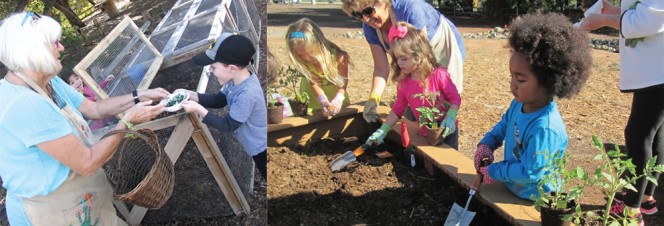Cuyamaca College in San Diego County involves young children, students and seniors in composting
and gardening on campus.
Rich Flammer
BioCycle March/April 2016
Cuyamca College in El Cajon, California recently began an onsite composting initiative that engages preschool children and seniors alike, provides a wide array of educational opportunities, and facilitates productive cooperation between multiple campus departments. In August 2015, the college started composting preconsumer food scraps from its dining service. The composting system, constructed of four Maven Compost Bins fastened together, handles about 30 pounds/day of food scraps.
Consultants, funded by the County of San Diego’s Food Waste Prevention and Composting Program, helped set up collection, developed monitoring and processing protocols, and assembled the four-bin composting system on the campus’ newly constructed Intergenerational Garden. The garden is maintained by volunteer seniors who proudly serve under the moniker “Gardening Grandmas.” Each month, they spend time with the children of the Cuyamaca Child Development Center, sowing, harvesting and providing both groups with nutritious, organic, locally grown snacks.

A 4-bin composting system (left) was installed at the campus’ newly constructed Intergenerational Garden (right). Photos courtesy of the Cuyamaca Child Development Center
Healthy Kids, Healthy Soils
The Cuyamaca Child Development Center (CDC) on campus is a “Child Development lab school” that provides learning and/or observation opportunities for students enrolled in the college’s child development courses and childcare services to students, staff, and community families. It ran a pilot where the preschool children practiced scraping food scraps on their plates into buckets for composting. The process was deemed an excellent educational tool and in line with the sustainability goals of both the CDC and Cuyamaca College.
The CDC serves children aged 18 months to five years old. Food scraps are generated from breakfast, lunch and snacks for up to 75 children onsite at a time. Nearly half a ton of food scraps was collected for composting by the fledgling program in just three months. While impressive, a far better output manifested from the children’s plate scraping activities. “Once we began separating unserved or uneaten foods for composting, I realized just how much food was being wasted,” notes Denise Blaha, CDC Coordinator. There were lots of uneaten processed foods, so she wondered if a healthier, more ethnically diverse menu would prompt the kids to eat more, and waste less.
Blaha began looking for a different food vendor, and hit the jackpot in finding the Neighborhood House Association (NHA), a partner of the Early Head Start Child Development program. The nonprofit NHA provides nutrition and food vending services to early childcare programs located throughout San Diego County. It employs a Farm to Preschool menu and curricula developed by the Urban & Environmental Policy Institute (UEPI) at Occidental College in Los Angeles, California.
The menus are created by NHA’s chef, a registered dietitian who strives to make each meal both nutritionally balanced and appealing to the kids they serve. Foods “incorporate seasonal, locally produced, natural and organic foods while remaining ethnically diverse,” says Blaha. Just as she quickly learned through observing a dramatic drop in plate scrapings and uneaten food, the NHA “has been able to demonstrate through high child and parental approval ratings that children do enjoy healthy food,” she adds. “Through Nutrition Services and Head Start, the Neighborhood House Association seeks to educate children about healthy food as a means to promote healthy lifestyles.”
Transitioning from pizza, tater tots and cheeseburgers — many of which ended up as food for microbes — to tuna salad sandwiches on wheat berry bread, roasted tumeric cauliflower and sesame slaw with snap peas, the children quickly began putting more highly nutritional feedstock in their bellies and less in the buckets heading to the composting bins.
Composting Logistics
Teachers and staff from the CDC are responsible for taking food scraps to the composting bins and adding them. The CDC is about 100 feet from the Intergenerational Garden’s composting area, facilitating the process.
Food scraps from Cuyamaca College’s cafeteria, the Coyote Cafe, are collected in 4.5gallon buckets and stored in a walk-in refrigerator until they’re delivered to the composting site on Thursdays. Busy weeks or spikes due to catering events may prompt an additional delivery on Tuesdays. Todd Wilbur, a student intern studying ornamental horticulture, manages the garden and has been trained by consultants to oversee the composting program. Wilbur mixes the scraps into the bins, aerates and waters the material, and monitors temperature, moisture, odor and other parameters related to the process.
The Gardening Grandmas also share some of the lighter composting duties with Wilbur and CDC students, primarily process monitoring such as taking temperatures and adding water. These activities combined with the planting, watering and harvesting duties shared at the Intergenerational Garden offer an invaluable hands-on learning experience for the preschoolers, college students, teachers and seniors, allowing them all to experience and assist in the progression of a full-loop nutrient cycle.
The program began capturing about 35 pounds/week of prep scraps only from the Coyote Cafe, then went up to about 100 pounds/week with the CDC’s participation. This amount represents all the food scraps the CDC is generating, both prep and plate, as well as all of the Coyote Cafe’s prep material. When combined with all of the educational opportunities offered, the program is an enormous success.
“These children are learning about composting, and at 3-, 4- and 5-years old, already know that what they’re doing is helping the garden grow and producing the food they eat,” explains Blaha, the driving force behind the CDC’s participation in campus composting. “At this age the benefits of composting are ingrained in them, and the practice becomes integral to how they view the entire food system.”
Rich Flammer of Hidden Resources, a BioCycle Contributing Editor, is a composting and zero waste consultant (www.compostingconsultant.com)










